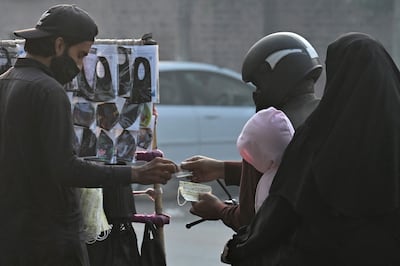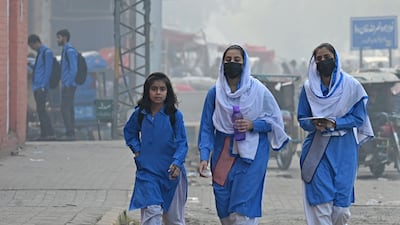A smog action plan that would include artificial rain to combat high levels of pollution has been introduced in Lahore, Pakistan, as the city alternates between number one and two on a list of the world’s most polluted cities.
Artificial rain could be the answer to the crisis, experts hope, as a cloud-seeding programme is initiated to try to help clear the smog.
The Punjab provincial government has already locked down some areas of the city, with markets and offices closed on Saturdays until 3pm and on Sundays.
The use of private cars is being limited, while authorities have also asked schools to restrict private car use for pupil pick-up and drop-off.
Nasimur Rehman, director of Punjab Environment Department, told The National that the air quality index (AQI) score in Lahore hovered around 265, although smog levels fluctuate on a daily basis.
The score considers pollutants including particulate matter, carbon monoxide, nitrogen dioxide, sulfur dioxide and ground level ozone. A value of 50 or below represents good air quality, while a score of more than 300 is considered hazardous.
"Under the smog action plan, traffic police are checking vehicles to either issue them fitness certificates or to rectify those which produce excessive smoke," Mr Rehman said.
"Also under the plan, authorities are working to install remission control systems at industries, while measures are also being taken to replace the stubble burning with machines that would remove plant remains from underground so that farmers do not need to burn stubble."
Dr Kiran Hameed, spokeswoman at the Punjab government’s smog and communicable disease control centre, told The National that a four-day-a-week lockdown in October helped to reduce smog levels, but those who live and work in the city remain at risk.
“Normally asthmatic patients and those suffering from eye, throat and other allergies are at risk because of high smog levels,” she said. "This is why we advise people to limit travel these days, always use facemasks and drink enough water.
“Heart patients must have an inhaler with them while travelling.”
The Punjab government is to initiate a cloud-seeding programme in late November after the state's Environment Minister Bilal Iqbal set up a working group to lead the plan.
Cloud-seeding works by using aircraft to disperse substances that alter processes within the cloud, modifying the quantity or nature of rain and helping smaller rain droplets to become bigger and heavier, so they fall to the ground.
Rain from cloud-seeding in India
It follows a similar cloud-seeding programme in New Delhi, India, which successfully induced substantial rainfall in some areas.
Dawar Butt, an environmental expert at the civil society organisation Pakistan Air Quality Initiative in Lahore, said artificial rain programmes were expensive and sometimes cause flooding.
“Artificial rain needs to be conducted at regular intervals for some time, three or four times a month, because it won’t work [doing it] just once,” he said.
Dr Hameed said the government was considering "all possible measures" for smog control.
She said the burning of stubble by farmers has been restricted because it contributes to environmental pollution.
Transport causes more than 80 per cent of the smog in Lahore, while industry and construction schemes also contribute, Mr Butt said.
Lahore also faces challenges resulting from substantial tree loss caused by the construction of new roads and buildings.
“The most important measure for the government to take is to dispose of old vehicles, which also comprise unregistered and illegal ones,” he said.
“All the schools must be bound to use only their buses and not allow students to use private cars for pick-up and drop-off. The lockdown of the city from time to time can also help to tackle the issue.”
In November, the Lahore High Court asked the Punjab government to consider the removal of Environment Department Director General, Zaheer Abbas Malik as well as the deputy commissioners of Sheikhupura, Hafizabad and Gujranwala districts if they continue to fail to tackle smog levels.
IQAir, an online pollution ranking platform, put Lahore on top and Delhi at number two in the list of the most polluted cities in the world today (Friday).
The IQAir divides air quality into six categories – good, moderate, unhealthy for sensitive groups, unhealthy, very unhealthy and hazardous.
The platform ranks the air quality of both cities as hazardous.
UAE v Gibraltar
What: International friendly
When: 7pm kick off
Where: Rugby Park, Dubai Sports City
Admission: Free
Online: The match will be broadcast live on Dubai Exiles’ Facebook page
UAE squad: Lucas Waddington (Dubai Exiles), Gio Fourie (Exiles), Craig Nutt (Abu Dhabi Harlequins), Phil Brady (Harlequins), Daniel Perry (Dubai Hurricanes), Esekaia Dranibota (Harlequins), Matt Mills (Exiles), Jaen Botes (Exiles), Kristian Stinson (Exiles), Murray Reason (Abu Dhabi Saracens), Dave Knight (Hurricanes), Ross Samson (Jebel Ali Dragons), DuRandt Gerber (Exiles), Saki Naisau (Dragons), Andrew Powell (Hurricanes), Emosi Vacanau (Harlequins), Niko Volavola (Dragons), Matt Richards (Dragons), Luke Stevenson (Harlequins), Josh Ives (Dubai Sports City Eagles), Sean Stevens (Saracens), Thinus Steyn (Exiles)
Electric scooters: some rules to remember
- Riders must be 14-years-old or over
- Wear a protective helmet
- Park the electric scooter in designated parking lots (if any)
- Do not leave electric scooter in locations that obstruct traffic or pedestrians
- Solo riders only, no passengers allowed
- Do not drive outside designated lanes
WIDE%20VIEW
%3Cp%3EThe%20benefits%20of%20HoloLens%202%2C%20according%20to%20Microsoft%3A%3C%2Fp%3E%0A%3Cp%3E%3Cstrong%3EManufacturing%3A%3C%2Fstrong%3E%20Reduces%20downtime%20and%20speeds%20up%20onboarding%20and%20upskilling%3C%2Fp%3E%0A%3Cp%3E%3Cstrong%3EEngineering%20and%20construction%3A%3C%2Fstrong%3E%20Accelerates%20the%20pace%20of%20construction%20and%20mitigates%20risks%20earlier%20in%20the%20construction%20cycle%3C%2Fp%3E%0A%3Cp%3E%3Cstrong%3EHealth%20care%3A%3C%2Fstrong%3E%20Enhances%20the%20delivery%20of%20patient%20treatment%20at%20the%20point%20of%20care%3C%2Fp%3E%0A%3Cp%3E%3Cstrong%3EEducation%3A%3C%2Fstrong%3E%20Improves%20student%20outcomes%20and%20teaches%20from%20anywhere%20with%20experiential%20learning%3C%2Fp%3E%0A
MATCH INFO
Chelsea 1
Alonso (62')
Huddersfield Town 1
Depoitre (50')
Astroworld
Travis Scott
Grand Hustle/Epic/Cactus Jack
Kat Wightman's tips on how to create zones in large spaces
- Area carpets or rugs are the easiest way to segregate spaces while also unifying them.
- Lighting can help define areas. Try pendant lighting over dining tables, and side and floor lamps in living areas.
- Keep the colour palette the same in a room, but combine different tones and textures in different zone. A common accent colour dotted throughout the space brings it together.
- Don’t be afraid to use furniture to break up the space. For example, if you have a sofa placed in the middle of the room, a console unit behind it will give good punctuation.
- Use a considered collection of prints and artworks that work together to form a cohesive journey.
ABU DHABI CARD
5pm: UAE Martyrs Cup (TB) Conditions; Dh90,000; 2,200m
5.30pm: Wathba Stallions Cup (PA) Handicap; Dh70,000; 1,400m
6pm: UAE Matyrs Trophy (PA) Maiden; Dh80,000; 1,600m
6.30pm: Sheikha Fatima bint Mubarak (IFAHR) Apprentice Championship (PA) Prestige; Dh100,000; 1,600m
7pm: Sheikha Fatima bint Mubarak (IFAHR) Ladies World Championship (PA) Prestige; Dh125,000; 1,600m
8pm: Sheikh Zayed bin Sultan Al Nahyan Jewel Crown (PA) Group 1; Dh5,000,000; 1,600m
LA LIGA FIXTURES
Friday
Granada v Real Betis (9.30pm)
Valencia v Levante (midnight)
Saturday
Espanyol v Alaves (4pm)
Celta Vigo v Villarreal (7pm)
Leganes v Real Valladolid (9.30pm)
Mallorca v Barcelona (midnight)
Sunday
Atletic Bilbao v Atletico Madrid (4pm)
Real Madrid v Eibar (9.30pm)
Real Sociedad v Osasuna (midnight)
'The Batman'
Stars:Robert Pattinson
Director:Matt Reeves
Rating: 5/5
Babumoshai Bandookbaaz
Director: Kushan Nandy
Starring: Nawazuddin Siddiqui, Bidita Bag, Jatin Goswami
Three stars
THE LIGHT
Director: Tom Tykwer
Starring: Tala Al Deen, Nicolette Krebitz, Lars Eidinger
Rating: 3/5
EMIRATES'S%20REVISED%20A350%20DEPLOYMENT%20SCHEDULE
%3Cp%3E%3Cstrong%3EEdinburgh%3A%3C%2Fstrong%3E%20November%204%20%3Cem%3E(unchanged)%3C%2Fem%3E%3C%2Fp%3E%0A%3Cp%3E%3Cstrong%3EBahrain%3A%3C%2Fstrong%3E%20November%2015%20%3Cem%3E(from%20September%2015)%3C%2Fem%3E%3B%20second%20daily%20service%20from%20January%201%3C%2Fp%3E%0A%3Cp%3E%3Cstrong%3EKuwait%3A%3C%2Fstrong%3E%20November%2015%20%3Cem%3E(from%20September%2016)%3C%2Fem%3E%3C%2Fp%3E%0A%3Cp%3E%3Cstrong%3EMumbai%3A%3C%2Fstrong%3E%20January%201%20%3Cem%3E(from%20October%2027)%3C%2Fem%3E%3C%2Fp%3E%0A%3Cp%3E%3Cstrong%3EAhmedabad%3A%3C%2Fstrong%3E%20January%201%20%3Cem%3E(from%20October%2027)%3C%2Fem%3E%3C%2Fp%3E%0A%3Cp%3E%3Cstrong%3EColombo%3A%3C%2Fstrong%3E%20January%202%20%3Cem%3E(from%20January%201)%3C%2Fem%3E%3C%2Fp%3E%0A%3Cp%3E%3Cstrong%3EMuscat%3A%3C%2Fstrong%3E%3Cem%3E%20%3C%2Fem%3EMarch%201%3Cem%3E%20(from%20December%201)%3C%2Fem%3E%3C%2Fp%3E%0A%3Cp%3E%3Cstrong%3ELyon%3A%3C%2Fstrong%3E%20March%201%20%3Cem%3E(from%20December%201)%3C%2Fem%3E%3C%2Fp%3E%0A%3Cp%3E%3Cstrong%3EBologna%3A%3C%2Fstrong%3E%20March%201%20%3Cem%3E(from%20December%201)%3C%2Fem%3E%3C%2Fp%3E%0A%3Cp%3E%3Cem%3ESource%3A%20Emirates%3C%2Fem%3E%3C%2Fp%3E%0A
Classification of skills
A worker is categorised as skilled by the MOHRE based on nine levels given in the International Standard Classification of Occupations (ISCO) issued by the International Labour Organisation.
A skilled worker would be someone at a professional level (levels 1 – 5) which includes managers, professionals, technicians and associate professionals, clerical support workers, and service and sales workers.
The worker must also have an attested educational certificate higher than secondary or an equivalent certification, and earn a monthly salary of at least Dh4,000.
Infiniti QX80 specs
Engine: twin-turbocharged 3.5-liter V6
Power: 450hp
Torque: 700Nm
Price: From Dh450,000, Autograph model from Dh510,000
Available: Now



